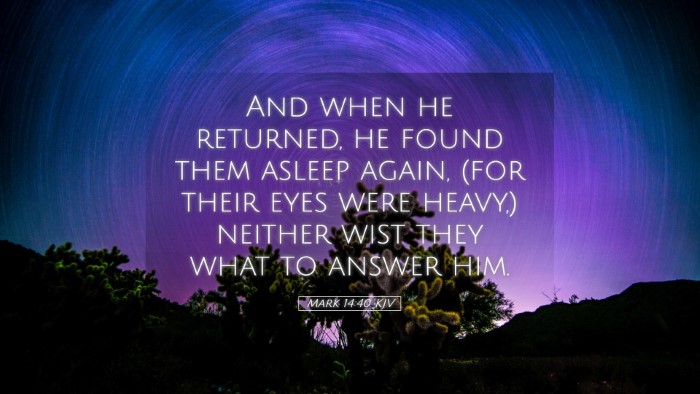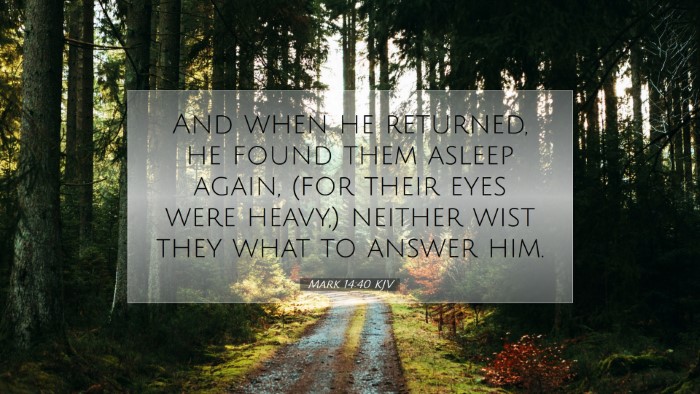Commentary on Mark 14:40
Verse Text: "And when he returned, he found them asleep again, for their eyes were heavy." (Mark 14:40, ESV)
Introduction
This verse captures a poignant moment during the agony of Gethsemane, where Jesus grapples with his impending crucifixion and the disciples struggle with fatigue. The commentary will draw upon insights from the works of Matthew Henry, Albert Barnes, and Adam Clarke to provide a detailed examination of the emotional and spiritual significance of this passage.
Contextual Background
In the wider context of Mark 14, Jesus has just shared the Last Supper with His disciples, establishing the new covenant and predicting His betrayal. Following this, He leads them to Gethsemane to pray. This passage is significant as it illustrates the intensity of Christ's sorrow and the contrasting weakness of His followers.
Matthew Henry's Insight
Matthew Henry emphasizes the emotional weight of this scene. He notes that Jesus' return to find His disciples asleep reflects both their physical exhaustion and spiritual unpreparedness. Henry remarks:
- Jesus' humanity is on full display, showcasing His desire for companionship in His darkest hour.
- The disciples' sleep signifies their inability to comprehend the gravity of the situation and their need for vigilance—both at that moment and in their future discipleship.
Albert Barnes' Perspective
Albert Barnes focuses on the implications of the disciples' drowsiness. He interprets their sleep as a metaphor for spiritual lethargy, arguing:
- Human weakness and susceptibility to temptation are highlighted; it serves as a cautionary tale for believers to remain alert in their spiritual vigilance.
- Barnes points out that this moment reflects a broader theme in the Gospel—human failure in contrast to divine faithfulness.
Adam Clarke's Commentary
Adam Clarke offers a detailed analysis of the psychological state of the disciples. He suggests:
- The exhaustion could also represent a deeper spiritual challenge, where they were overwhelmed by the gravity of Jesus' forthcoming sacrifice.
- Clarke draws parallels to the Christian experience, noting that even the most dedicated can falter under pressure—the necessity of prayer as a means of strengthening faith is underscored.
Theological Implications
This verse raises essential theological questions about human nature, temptation, and reliance on divine strength. The inability of the disciples to remain awake serves as a foreshadowing of their impending abandonment in Jesus’ hour of need.
Human Weakness
All three commentators highlight the universal nature of human weakness. The disciples' struggle resonates with contemporary Christian experiences of fatigue and distraction in spiritual life:
- As mentioned by Henry, there is an earnest need for believers to combat spiritual apathy through prayer.
- Barnes emphasizes the call to readiness—an awareness of one’s spiritual state and the ongoing need for vigilance against temptation.
- Clarke's insights invite reflection on how personal struggles often parallel communal spiritual challenges.
Prayer and Vigilance
The call to prayer emerges powerfully from this passage. Each commentary points out that the disciples’ failure to pray and stay awake not only affects them but also impacts their Lord:
- Henry suggests vigilance through prayer is vital to withstand trials.
- Barnes notes that spiritual vigilance is a defensive measure against the enemy.
- Clarke posits that consistent prayer is necessary for sustaining faith in tumultuous times.
Conclusion
Mark 14:40 offers profound insights into the human condition and the necessity of prayer and vigilance. The commentary from Henry, Barnes, and Clarke provides a multi-faceted understanding of this verse, shedding light on its significance within the broader narrative of the Gospel.
For pastors, students, theologians, and scholars, this moment in Gethsemane serves as a stark reminder of the need for spiritual preparedness and reliance on God, especially during times of trial. The lessons drawn from the disciples' shortcomings encourage believers to seek a deeper relationship with God through prayer and awareness, ensuring they remain active participants in their faith journeys.


